Partners and Collaborators included City agencies, local businesses, community base nonprofits and community housing residents.
City Department of Community Services
City Office of Climate Change, Sustainability and Resiliency
City Department of Land Management
City Department of Parks and Recreation
Hawai‘i Community Foundation
SSFM International, Project and Construction Management
Kōkua Kalihi Valley
Supersistence
Edible Landscaping & More
Grow Fruit Together LLC
Higher Grounds Gardens
Island Foodscapes
Hawaiian Earth
Agrefab
“Growing our own food on-island is vital to making our community more resilient. Expanding our food production footprint will not only provide locally grown produce; it is part of a movement where the food we eat is grown, picked, processed, distributed, and prepared by the people of Oʻahu for the people of O‘ahu. Along with helping to sustain the bodies of those affected most by the pandemic, this project will also feed their spirits as they see their hard work grow into what will become vibrant urban gardens.”
Kirk Caldwell, Mayor, City and County of Honolulu
“This pandemic has truly shone a light on the need for food security among our vulnerable communities. Each of these project locations is a place that has offered safety and stability to ‘ohana through housing. Now we get to work together to plant literal seeds for their future that will help to feed nearly 1,100 residents not just for weeks or months, but for years to come.”
Pamela Witty, Director,City and County of Honolulu, Department of Community Services
“My son really loves tomatoes and picking them off the vine so we are both really excited to see them growing. He is fascinated with the whole process, and it’s a good teaching opportunity for him.”
April Keller, Resident, ALEA Bridge in Hale‘iwa
Urban Gardens Take Root at City Housing for Vulnerable Kama’aina
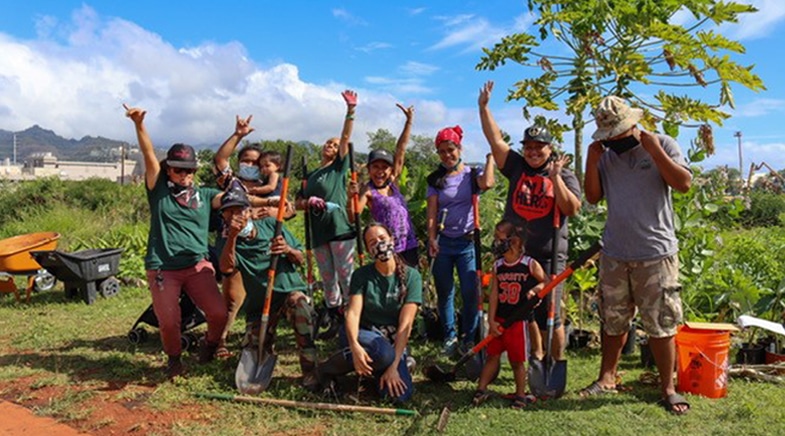
IHS Taking Root program
A public-private partnership sprouted in late 2020 between SSFM and City agencies, local businesses, and nonprofits with the aim of delivering an urban garden foodscaping pilot project to the City’s special needs housing populations. The result? Seven pilot sites serving nearly 1,100 residents within a timeframe of 30 days.
The program was made possible through the City & County of Honolulu Coronavirus Relief Fund administered by the Hawai‘i Community Foundation. Funding provided to states and cities through the CARES Act helped to offset impacts to the hardest hit populations, particularly those who are at-risk, low-income, or otherwise vulnerable to economic stresses. The City & County of Honolulu (City) contracted Hawai‘i Community Foundation to administer the CARES Act emergency relief funds (Coronavirus Aid, Relief, and Economic Security) for Hawai‘i nonprofits, businesses, and individuals.
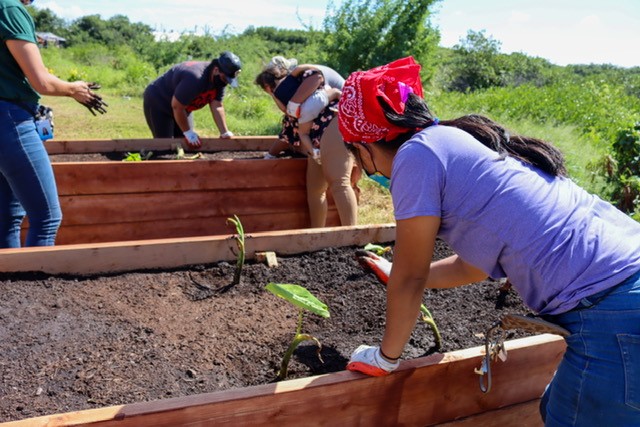
Planting kalo
The Department of Community Services brought together a coalition of public and private partners to explore the development of a pilot program that would provide sustainable, fresh produce to these vulnerable populations. As a result, a CARES Act emergency relief fund grant application was submitted by SSFM International, seeking funding for a pilot project to establish urban gardens within the City’s housing facilities. This project supported the goal of responding to economic hardship caused by COVID-19, while also aligning with the goals of Honolulu’s Resilience Strategy and the Aloha+ Challenge, Hawai‘i’s statewide commitment to achieve sustainability goals.
Hawai‘i Community Foundation approved SSFM’s CARES grant request at the beginning of November 2020, providing $350,000 for this ambitious program. Along with the funds came a mandate that all expenditures must be incurred by November 30.
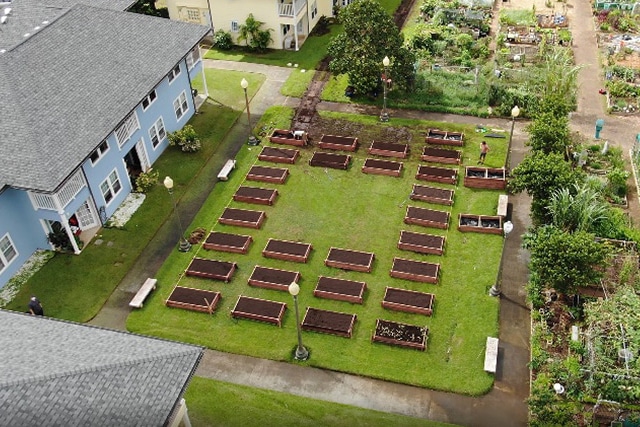
Aerial view of Manoa Gardens nstallation
Modeling Success
While the COVID-19 pandemic has created tremendous hardship, it has also created openings for projects like the urban garden foodscaping pilot program. Short term, the project addressed immediate economic hardship being experienced due to COVID-19, while providing much needed immediate financial support to local businesses including partners who brought the gardens to life. The pilot program’s success will hopefully seed future expansion of programs to bring sustainable food production to some of the City’s most vulnerable residents, in support of the City’s resilience and sustainability initiatives. The program also created lasting benefits for the communities served, including education, community building, and healthy outdoor activities for residents to engage in. The site selection and installation process was documented by the project team using site visit logs, GIS mapping, photography, video, and drone footage, as well as budget and expense tracking and reporting. This documentation is being provided to the City to be used to inform future efforts.
Overall, the project exemplifies a community resiliency investment using locally-sourced, green infrastructure to further multiple objectives including food security, economic relief, local agriculture, and community health.
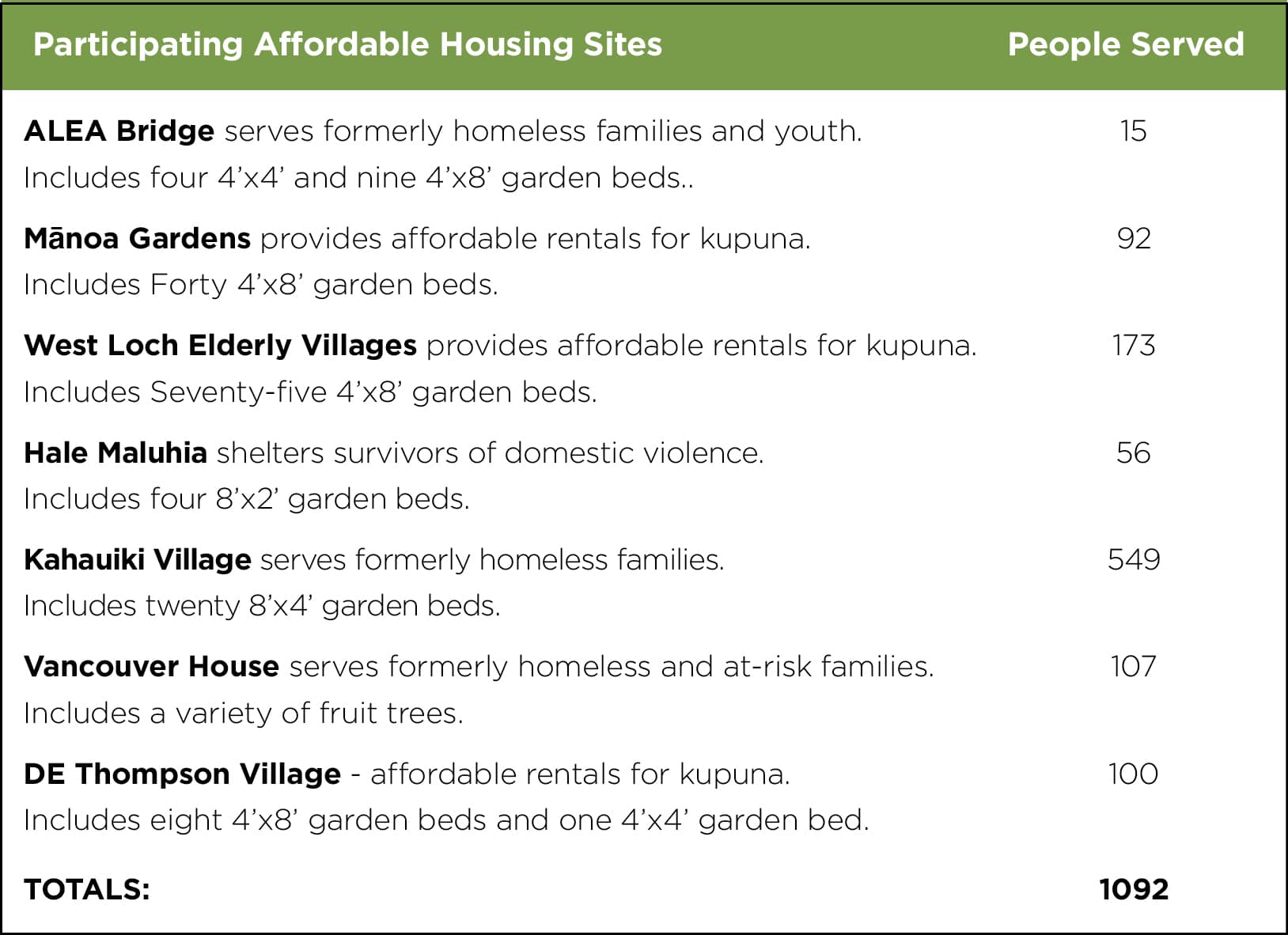
The Program
While relatively straightforward in concept, bringing 7 community gardens to life presented innumerable challenges beginning with identifying candidate sites within the The City’s housing facilities. With just 30 days to complete the project, determining the number and location of the sites and their ability to meet the deadline was the first step. As the project managers for the foodscaping program, the SSFM implementation team, designed and developed packages of custom-fabricated garden beds and fruit trees, established consistent pricing and budgets, and oversaw coordination and implementation. After three pilot sites successfully proved the project’s viability, the project team was able to add four additional sites. The project met the 30 day schedule required by the grant funding.
“The cooperation and motivation of the site property managers was crucial to the pilot program’s success,” explained SSFM’s Project Manager Melissa May, a Senior Planner in SSFM’s Strategic Services Group and a Resilience Practice Leader. “The enthusiasm of the residents and their involvement in the process enabled us to realize the project and will undoubtedly contribute to its enduring value for the community.”
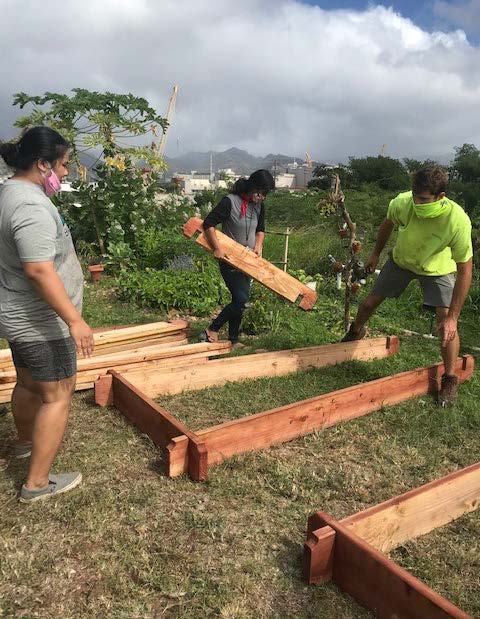
Kahauiki Village
Urban Gardens Take Root at City Housing for Vulnerable Kama’aina

IHS Taking Root program
A public-private partnership sprouted in late 2020 between SSFM and City agencies, local businesses, and nonprofits with the aim of delivering an urban garden foodscaping pilot project to the City’s special needs housing populations. The result? Seven pilot sites serving nearly 1,100 residents within a timeframe of 30 days.
The program was made possible through the City & County of Honolulu Coronavirus Relief Fund administered by the Hawai‘i Community Foundation. Funding provided to states and cities through the CARES Act helped to offset impacts to the hardest hit populations, particularly those who are at-risk, low-income, or otherwise vulnerable to economic stresses. The City & County of Honolulu (City) contracted Hawai‘i Community Foundation to administer the CARES Act emergency relief funds (Coronavirus Aid, Relief, and Economic Security) for Hawai‘i nonprofits, businesses, and individuals.

Planting kalo
The Department of Community Services brought together a coalition of public and private partners to explore the development of a pilot program that would provide sustainable, fresh produce to these vulnerable populations. As a result, a CARES Act emergency relief fund grant application was submitted by SSFM International, seeking funding for a pilot project to establish urban gardens within the City’s housing facilities. This project supported the goal of responding to economic hardship caused by COVID-19, while also aligning with the goals of Honolulu’s Resilience Strategy and the Aloha+ Challenge, Hawai‘i’s statewide commitment to achieve sustainability goals.
Hawai‘i Community Foundation approved SSFM’s CARES grant request at the beginning of November 2020, providing $350,000 for this ambitious program. Along with the funds came a mandate that all expenditures must be incurred by November 30.
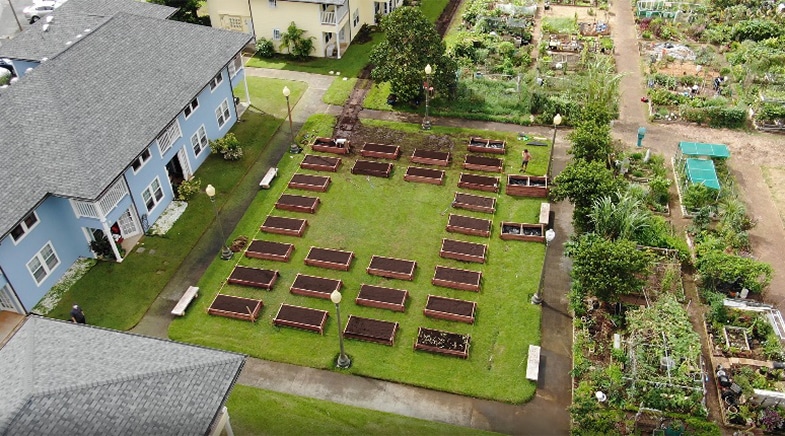
Aerial view of Manoa Gardens Installation
Modeling Success
While the COVID-19 pandemic has created tremendous hardship, it has also created openings for projects like the urban garden foodscaping pilot program. Short term, the project addressed immediate economic hardship being experienced due to COVID-19, while providing much needed immediate financial support to local businesses including partners who brought the gardens to life. The pilot program’s success will hopefully seed future expansion of programs to bring sustainable food production to some of the City’s most vulnerable residents, in support of the City’s resilience and sustainability initiatives. The program also created lasting benefits for the communities served, including education, community building, and healthy outdoor activities for residents to engage in. The site selection and installation process was documented by the project team using site visit logs, GIS mapping, photography, video, and drone footage, as well as budget and expense tracking and reporting. This documentation is being provided to the City to be used to inform future efforts.
Overall, the project exemplifies a community resiliency investment using locally-sourced, green infrastructure to further multiple objectives including food security, economic relief, local agriculture, and community health.

The Program
While relatively straightforward in concept, bringing 7 community gardens to life presented innumerable challenges beginning with identifying candidate sites within the The City’s housing facilities. With just 30 days to complete the project, determining the number and location of the sites and their ability to meet the deadline was the first step. As the project managers for the foodscaping program, the SSFM implementation team, designed and developed packages of custom-fabricated garden beds and fruit trees, established consistent pricing and budgets, and oversaw coordination and implementation. After three pilot sites successfully proved the project’s viability, the project team was able to add four additional sites. The project met the 30 day schedule required by the grant funding.
“The cooperation and motivation of the site property managers was crucial to the pilot program’s success,” explained SSFM’s Project Manager Melissa May, a Senior Planner in SSFM’s Strategic Services Group and a Resilience Practice Leader. “The enthusiasm of the residents and their involvement in the process enabled us to realize the project and will undoubtedly contribute to its enduring value for the community.”

Kahauiki Village
